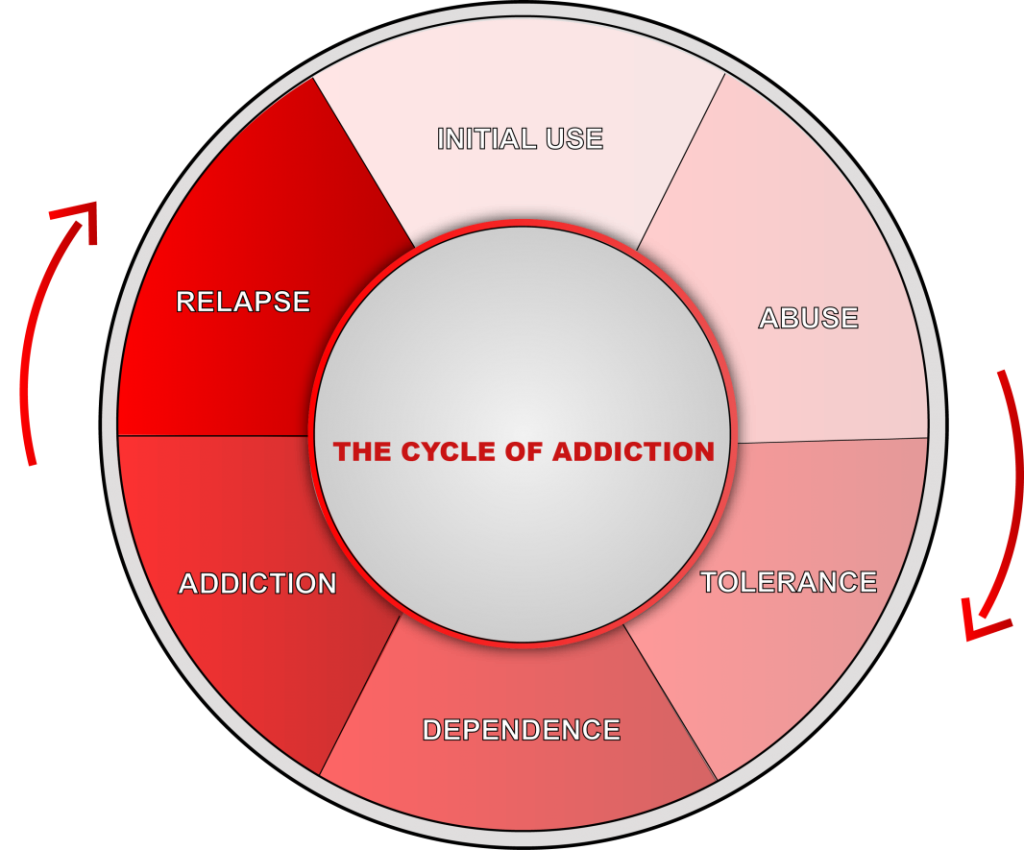Drug addiction, also known as Substance Use Disorder, is classified as a relapsing disorder that causes compulsive drug usage despite the negative consequences associated with it. As a result, addiction can have long-lasting effects on the brain, which depending on the drug, can include memory problems and psychosis.
Before a person develops a drug addiction, they can choose whether or not they want to use drugs. However, this choice disappears when the chemistry of someone’s brain begins to change and they start to develop a dependency on the drug. Over time, someone who abuses drugs will develop a tolerance to them, meaning that more of the drug may be needed to create the same high. This compounds to create a stronger dependence on substances, which can lead to even more reckless behavior and destructive consequences than before.
But how is this life-changing dependency created? What is happening chemically inside the brain when someone develops a drug addiction, and how is this impacted by recovery treatments?
Addiction: an inside look into the brain

The brain consists of neurons, cellular components that communicate with each other through sent signals. These neurons receive information about stimuli in a person’s environment and send messages to the body that instruct it to act accordingly. Essentially, neurons are responsible for every thought and action a person has.
Neurons send signals to each other by releasing neurotransmitters, or chemical messengers, that travel through the space between them. One of these neurotransmitters, dopamine, is what encourages someone to repeat activities that cause pleasure. The brain, which is wired to try to maximize the likelihood that we will repeat actions that create happiness, releases dopamine when something desirable occurs. This sends a signal encouraging the brain to remember what happened and changes neural connectivity to make repeating that action in the future easier.
In most cases, this release of dopamine doesn’t pose a problem. In fact, it can actually be quite helpful. For instance, if you eat a meal that you really like, your brain will release dopamine, which will help you remember that you enjoy it and will make it easier to repeat the action of eating that same meal at a later point. In other words, dopamine helps draw a connection between an action and the pleasure it creates.
Not only do drugs create intense feelings of pleasure, they also release an enormous amount of dopamine, which makes it easier for the brain to establish and, with recurring usage, reinforce the connection between using the drug and the resulting feelings of euphoria.

The brain responds to the influx of dopamine by either releasing less neurotransmitters or reducing the number of receptors capable of receiving neurotransmitters. This means that, for a person who uses drugs, the amount of pleasure they receive from the normal activities they used to do is significantly lower.
In order to regain that same level of pleasure they experienced in the past–a normal level of pleasure–addicts must continue turning to drugs. This creates a dangerous cycle where further usage creates a stronger tolerance for the drug, which then means that more of it needs to be taken in order to get high. As a result, those who struggle with addiction don’t like the drug as much as they used to when they began using it, but develop a dependence on it because it is the only way they can feel pleasure. In addition, addicts also suffer several physiological, cognitive, and social consequences from using drugs for a long period of time.
Recovery: overcoming triggers and developing new habits

Despite the dangerous toll drug usage and addiction can take on one’s behavior and health, research shows that it is possible for the brain to recover from addiction, although the risk of it reappearing will always be there. In other words, the brain can be rewired so it no longer depends on drugs as a way to achieve a normal state of pleasure.
One of the difficulties when it comes to combating addiction is dealing with triggers–situations, environments, people, and feelings that release dopamine in the brain and create an intense urge to turn to drugs. While these triggers are often subconscious, meaning that people can’t decipher what causes them, treatment can help people learn how to cope with them without having to turn back to drugs.
Part of the process of recovering from addiction is developing new neural pathways, standard routes in the brain that send signals between neurons. Addiction creates neural pathways in the brain since it alters its chemical state. When the drug is no longer being used, the brain is forced to create new neural pathways. This is difficult at first but becomes easier over time due to the brain’s neuroplasticity, or ability to change and reorganize these pathways, which can help squash self-destructive habits and choices and instead create alternative pathways that favor healthier life choices.
Drug usage can easily lead to addiction, which, unfortunately, can also lead to serious long term health effects. Not to mention, the brain’s altered state on drugs makes it extremely difficult to fall out of the cycle of heavy usage. However, this doesn’t mean a person will be addicted to drugs indefinitely–the brain’s neuroplasticity and ability to create new neural pathways can make it possible to overcome addiction, but doing so takes active effort to recover.
